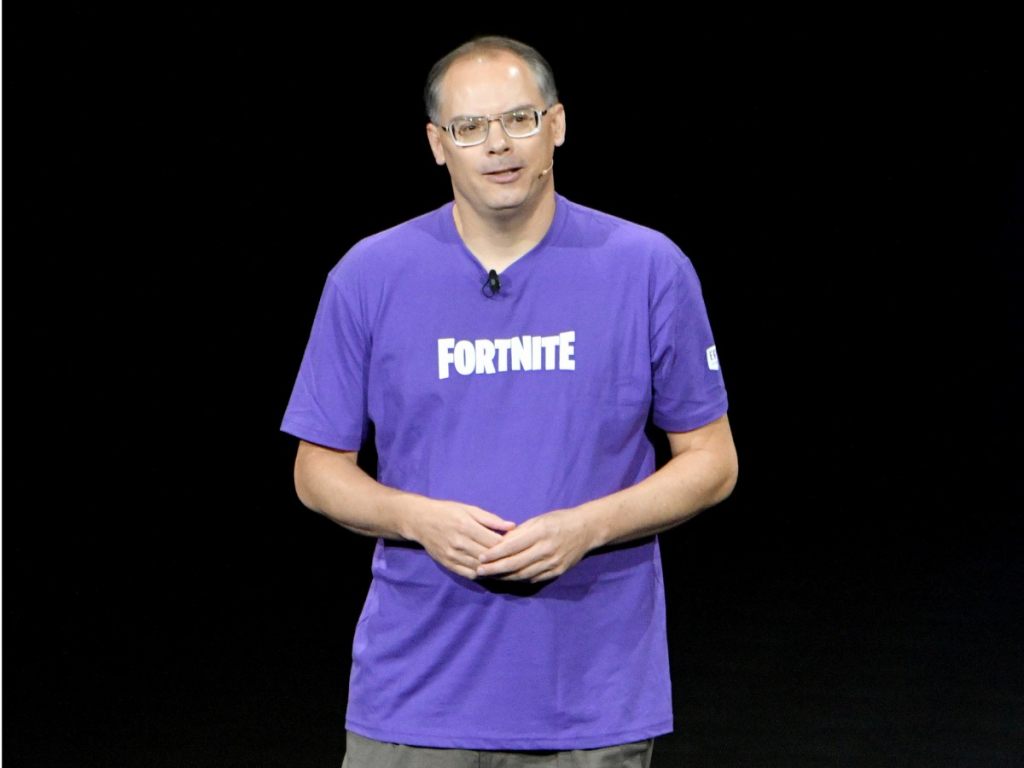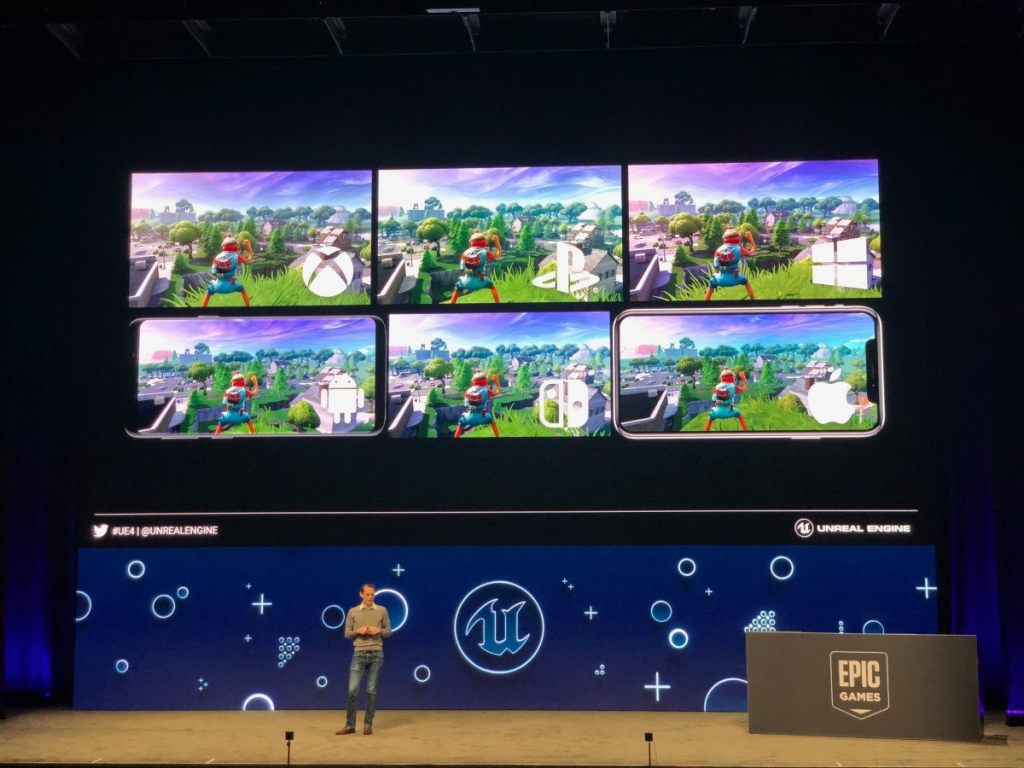
- Tim Sweeney, the CEO ofEpic Games, tells Business Insider that the success of “Fortnite” shows that there’s no such thing as a “mobile gamer” or a “console gamer” anymore – there’s just gamers.
- That’s a big part of why the company this week launched Epic Online Services, which will let video game developers easily create games that include cross-play across PCs, consoles, and smartphones.
- Sweeney says that it’s all based on tech that Epic came up with itself for “Fortnite,” and indeed, the success of that game has allowed the company to reinvest in Unreal Engine and the Epic Games Store, businesses that serve outside developers.
- Epic is making a big push towards helping other developers succeed, pro bono, because Sweeney says what’s good for the industry is good for the company.
Last year, Epic Games successfully convinced Sony to allow players of its smash-hit game “Fortnite” to battle each other across PlayStation and Xbox – a big win, given that Sony had publicly resisted this so-called cross-play.
At this week’s GDC, Epic doubled down on this push towards cross-play, releasing the already-announced Epic Online Services, a free set of tools to help power online games. Among other features, it lets developers enable cross-play in their games across Windows, Mac, and Linux, with support for PlayStation 4, Xbox One, Nintendo Switch, Apple iOS, and Android coming soon.
Tim Sweeney, the CEO and cofounder of Epic Games, tells Business Insider that Epic Online Services was born from the lessons the company learned from the wild success of “Fortnite,” and all the systems the company put in place to support the massive influx of players. Now, he says, he wants other developers to benefit from that success.
“Fortnite’s paved the path for a lot of things. I think the cross-platform experience … companies throughout the industry are not taking advantage of that yet. And I think that’s a huge opportunity for further work,” Sweeney said in an interview with Business Insider at the Game Developer’s Conference in San Francisco.
Indeed, he says that the game industry is somewhat missing the point when it comes to the importance of cross-play. More than just a player-friendly feature that encourages more people to spend more time with more games, he says cross-play is a small part of a much bigger trend in video games that many are overlooking.

- Epic Online Services uses the tech behind “Fortnite” to help developers bring their games to every platform.
- Matt Weinberger/Business Insider
Sweeney says that the industry is very focused on only putting certain types of games on certain platforms – the conventional wisdom for years has held that intense action shooters like “Fortnite” have no place on the smartphone, where puzzle games and simple arcade-style titles rule the roost.
Epic rejected this school of thought: Rather than releasing “a different game that was a dumbed down mobile experience,” says Sweeney, Epic instead opted to “port the full game, and trust that players want great games on mobile devices, and that players will play a real shooter on mobile devices.”
To his point, “Fortnite” on smartphones is exactly the same game as the versions that run on larger screens, with every match populated by players across all platforms. In fact, Sweeney says that plenty of “Fortnite” players don’t just limit themselves to one platform or another, using a variety of devices to play the game. It proves that players don’t actually care about what games play on which device, he says; they just want to play good games.
“The genre thing is overrated, and the platform decisions are overrated,” Sweeney says. “It’s what we see on ‘Fortnite,’ so many of these gamers play on a variety of devices, so you can’t say they’re a mobile gamer or a console gamer. They’re just a gamer.”
He thinks that the video game industry hasn’t quite wrapped its head around this yet, but that there’s hope.
“I think that the industry is getting better every day. Everybody is coming to the recognition now that this is good for all our businesses,” says Sweeney. “I mean, it’s both good and it’s inevitable.”
The bigger picture
In general, Sweeney says, the success of “Fortnite” has given Epic the runway to reinvest in other aspects of its business.
Sweeney notes that Epic’s business has always been cyclical – over the years, it’s been responsible for hits like the Unreal and Gears of War franchises, which were tremendous blockbusters in their own right, but which have since either lain dormant or else gone off to other developers to continue.
“‘Fortnite’ is really big, but two years ago, that entire revenue was zero,” says Sweeney.
Since 1998, however, Epic began offering the Unreal Engine, which has since become a standard engine for game development. More recently, it opened the Epic Games Store, a digital storefront.
“We’re a company that’s gone through many cycles and evolutions, and every time we have a major success we double down and use the money from that to fund our initiatives and so forth,” says Sweeney.
In this case, that reinvestment has resulted in new pushes like Epic Online Services. Notably, while it definitely works with Epic’s own Unreal Engine, these online services are also compatible with competing engines including Unity and Amazon’s Lumberyard. Sweeney says that there are no strings attached; it’s all part of a plan to make the whole industry better, reflecting Epic’s distaste for “walled gardens” that benefit a platform holder at the expense of others.

- The smash success of “Fortnite” has given Epic Games a lot of runway to reinvest in its businesses.
- “Fortnite”/Epic Games
Similarly, Epic also this week announced a new program called Epic MegaGrants, a $100 million fund to give money to academic projects, open source software, game developers, and anybody else doing anything at all related to the Unreal Engine. Again, there are no strings attached, and no expected return on the investment. And, as Sweeney notes, it’s the extension of the previous Epic Grants, a similar $5 million fund – with the huge jump from $5 million for the first iteration to $100 million for the new one as a sign of “Fortnite’s” success, says Sweeney.
Sweeney says that it’s Epic’s position that these grants are worth it for the prospect of building the Unreal Engine ecosystem, and pushing the games industry forward as a whole.
“These are things that enhance the community and grow it for everybody, including us,” says Sweeney.
He acknowledges that there are places where Epic’s status as the proprietor of the Unreal Engine and Epic Games Store might lead to moments where it competes with outside developers who use its technology – anybody could, in theory, use Epic Online Services to build a game that’s bigger than “Fortnite,” on as many platforms.
But Sweeney says that the industry has a “very healthy attitude” to this kind of dynamic in general, with everyone part competitor and part “supplier” to each other. And, in fact, he says that this is how things should be, with developers free to pick and choose which technology they want to use, and how they use it.
“We’re always trying to provide the best service, and if somebody provides a better service, that’s when [customers] will go to them and not us, and that’s on us,” Sweeney says.








